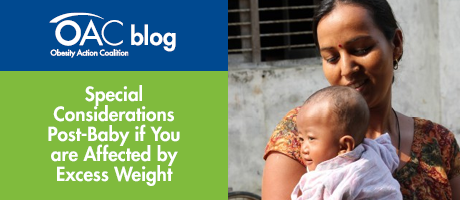
Special Considerations Post-Baby if You are Affected by Excess Weight
by Nicole Avena, PhD

Unfortunately, giving birth does not mean you will magically have the same stomach you had before you got pregnant. However, before jumping right into an exercise and diet routine to return to pre-baby status, take it easy and enjoy these first few days with your baby. You’ll want to wait until you have the OK from your doc before exercising and any attempt to lose weight should be put on hold until you have established a breastfeeding pattern and your uterus has shrunk back to its normal size. Right now, the best thing you can do is get into a routine with your baby and then figure things out from there.
The easiest way to lose weight after your pregnancy is to not gain too much during your pregnancy. This is partly because you may establish a healthy eating and exercise routine while pregnant that you can continue after giving birth instead of diving head first into a whole new weight loss plan. However, maintaining an ideal pregnancy weight is not what happens for many of us, so it is important to keep in mind the following tips.
Continuing or starting to exercise post-baby can be extremely difficult with an unpredictable schedule, lack of sleep and/or lack of time. There are a few things you can do to overcome these obstacles, which may help you feel better and sleep better! If it’s a nice day outside, take your baby out for at least a 30 minute stroll or try running. Your little one might enjoy the ride as much as you, or even take a relaxing nap while you get your exercise in. Another way to squeeze in a workout without worrying about childcare is to do an at home workout with the help of a fitness DVD or online. Even if you can get to a gym but still don’t know how to fit time in to your busy schedule, make a plan that works for you and stick to it. Find a way to hold yourself accountable, such as the support of your friends or other new moms, to make sure you do your exercise.
In addition to maintaining a healthy pregnancy weight, breastfeeding is another way that may help aid in shedding pounds. Breastfeeding is strongly supported by the American Congress of Obstetrics and Gynecologists, and some research suggests breastfeeding can get rid of postpartum weight retention within 6 months! This effect will be the most effective if weight gain is not excessive during pregnancy.
Regardless of weight gain or eating habits, after you’ve given birth, cravings and the desire to “eat for two” may still linger, making it difficult to maintain a healthy diet and even more difficult to return to your pre-baby weight. There is more than enough research to show that staying away from junk food and eating more healthful foods like fruits and vegetables is essential to avoiding postpartum weight retention. Lack of time and sleep play a huge role in our food choices, especially considering that lack of sleep tends to increase our food intake as well as intake of high fat/high carb foods. So then how do you maintain a healthy eating pattern post-pregnancy and not give in to cravings or not-so-healthy convenience foods?
First, find some recipes that you can put together quickly as well as foods that require minimal preparation. Fruits and raw vegetables are always a good choice, as well as nuts, seeds and dried fruits. Keep a bag of almonds and low-sugar granola bars in your car or the diaper bag in case hunger strikes, and place your fruits and vegetables where they are most visible in the kitchen (you’re more likely to reach for the first thing you see).
Don’t skip breakfast–instead, opt for one of your quick recipes such as quick cooking oats with banana, cereal with milk and fruit, or even an egg with toast. You may not necessarily be hungry when you wake up in the morning but a wholesome breakfast could save you from overeating later in the day. In fact, eating throughout the day will also save you from having hunger attacks at inconvenient times (i.e. in the middle of the night or when your only option is fast food).
Last but not least, stay hydrated at all times! Water consumption is always important, especially postpartum and when breastfeeding, since breast milk is mostly water. Drinking water keeps you feeling energized, your body functioning, and may help keep cravings at bay–too often we turn to food when some sort of craving strikes, but your body may just be thirsty.
Maintaining a healthy lifestyle can be difficult, and changing your lifestyle to be healthful may be even harder. Utilize your support system as much as possible to not only keep yourself accountable, but also to make this process much easier. Remember that for the most successful outcome, you will want to focus on healthy habits pre-baby. Even if you are just thinking about getting pregnant, start treating your body like you already are; cut down or eliminate alcohol consumption, increase your intake of fruits, vegetables, and whole grains, decrease your intake of high fat, high carbohydrate foods and focus on eating a variety of nutrient dense foods. You may also want to think about when or how you will find time to exercise once the baby comes. Will you go for morning walks? Pop in a fitness DVD? Whatever it is, try to incorporate some version of your fitness plan into your schedule and start making it a habit. That way, you won’t have to think twice about being healthy, it’s just the way you live! The better you treat yourself, the better you will feel, and the more you will enjoy your pregnancy and new baby.
Special thanks to Katherine Bishop, M.S., for her assistance with this post.
About the Author:
Dr. Nicole Avena is a research neuroscientist, author and expert in the fields of nutrition, diet and addiction. She received a PhD. in Neuroscience and Psychology from Princeton University, followed by a postdoctoral fellowship in molecular biology at The Rockefeller University in New York City. She has published over 70 scholarly journal articles, as well as several book chapters and books, on topics related to food, addiction, obesity and eating disorders. She also edited the books, Animal Models of Eating Disorders (2012) and Hedonic Eating (2015), coauthored the popular book of food and addiction called Why Diets Fail (Ten Speed Press), and recently finished her new book, What to Eat When You’re Pregnant, which is available now for presale and in bookstores June 9th. Her research achievements have been honored by awards from several groups including the New York Academy of Sciences, the American Psychological Association, the National Institute on Drug Abuse, and her research has been funded by the National Institutes of Health (NIH) and National Eating Disorders Association. To learn more about Dr. Avena, please visit www.drnicoleavena.com, twitter.com/DrNicoleAvena, or www.facebook.com/DrNicoleAvena.

